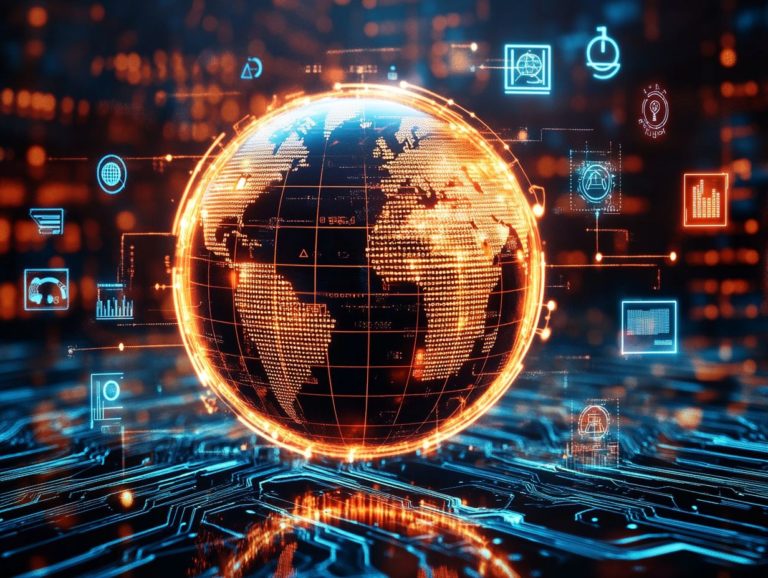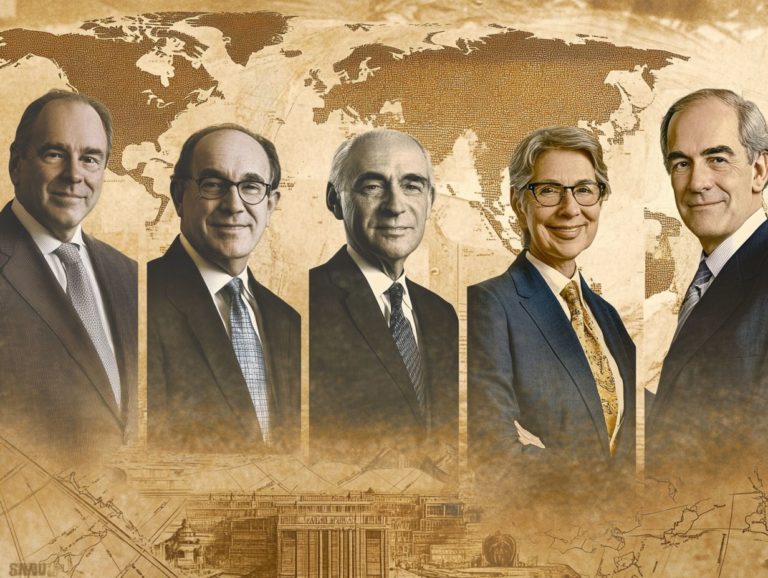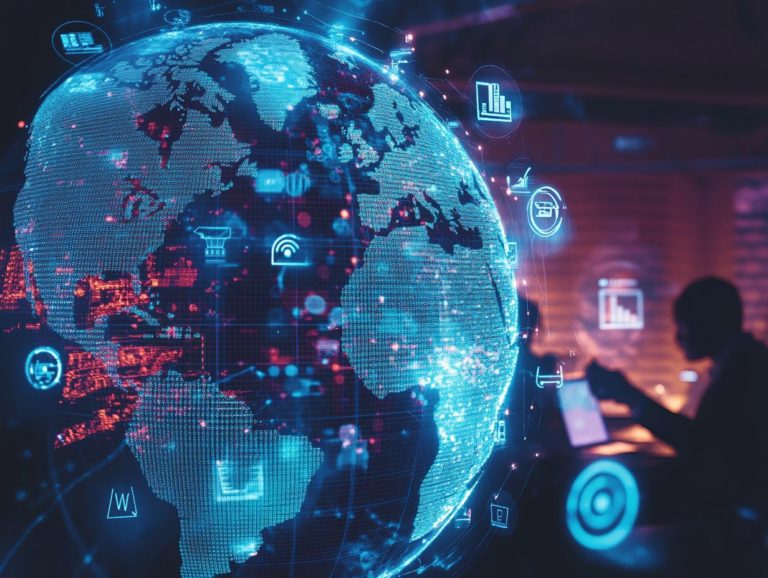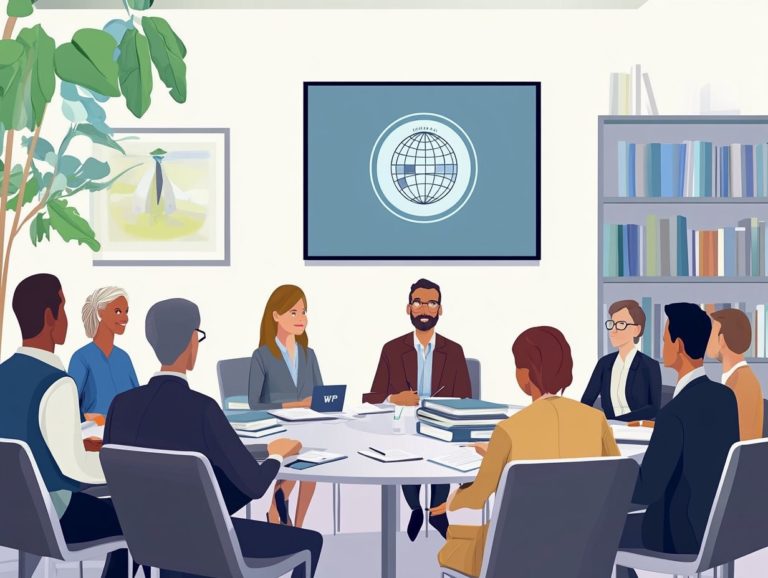5 Most Common IP Law Violations Worldwide
Intellectual property (IP) law is essential for protecting the creativity and innovation that drive your business and the economy.
However, violations such as counterfeiting, patent infringement, and copyright theft are alarmingly prevalent. These issues present significant risks to both creators and companies like yours.
Explore the five most common IP law violations happening globally with us! Learn their impacts and how to protect yourself.
You ll also discover which industries are most affected, the global nuances in IP laws, and practical steps for reporting and preventing these violations.
Dive in to grasp the landscape of IP protection and appreciate the vital role it plays in fostering innovation within your enterprise.
Contents
Key Takeaways:
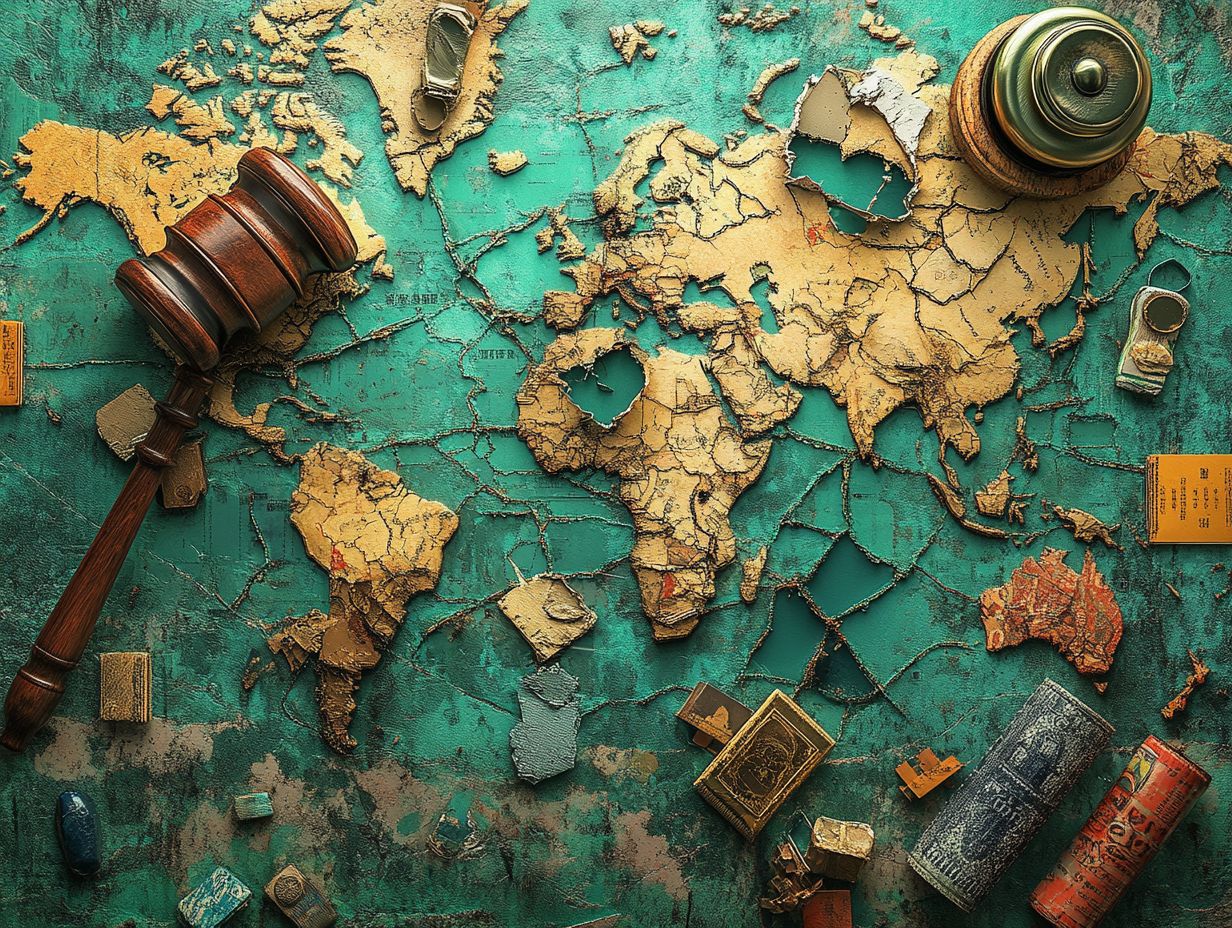
2. Patent infringement poses a major threat to businesses, especially in the technology and pharmaceutical industries, where valuable inventions are at risk of being copied or stolen.
3. Trademark infringement is a common issue for companies with well-known brands, as unauthorized use of their trademarks can lead to consumer confusion and damage to their reputation.
1. Counterfeiting and Piracy
Counterfeiting and piracy present formidable challenges to your intellectual property (IP) in today s economy. These issues impact not just economic growth but also job stability across various sectors.
Unauthorized use of creative works undermines legitimate businesses and creates confusion among consumers. These illicit practices manifest in various ways think counterfeit luxury goods, dubious pharmaceuticals, software piracy, and trademark violations.
This creates a tangled web of complications for the industries affected. The economic fallout can be significant. The fashion and technology sectors often face considerable revenue losses, leading to job cuts and hindering innovation.
Consumer perception is also on the line, as individuals may unknowingly purchase inferior products, eroding trust in brands and compromising overall market integrity.
Legal frameworks, like the TRIPS agreement, help countries enforce IP laws and protect the rights of creators. They provide mechanisms for enforcement and punishment, reinforcing the importance of IP rights while fostering an environment where creativity can truly flourish.
2. Patent Infringement
Patent infringement occurs when you make, use, or sell an invention without obtaining permission from the patent holder. This can lead to significant financial repercussions and legal consequences that may ultimately undermine the economic value of innovation.
Such violations can take many forms. You might encounter:
- Direct infringement, where a product is replicated without authorization.
- Indirect infringement, which involves a third party contributing to the infringement without directly manufacturing the product.
High-profile cases, like Apple versus Samsung, illustrate how costly these disputes can become, affecting consumer choice and shaking up market dynamics.
For businesses like yours, such infringements can erode competitive advantage, stifling potential earnings and innovation. Don t let your ideas be copied! Understand how patent infringement works and protect your innovations.
This is why patent enforcement actions are crucial. They not only defend intellectual property but also reinforce the framework that fosters technological advancement.
The U.S. government plays an essential role in this arena, enhancing protection measures to ensure that inventors can confidently navigate the complexities of patent laws.
3. Trademark Infringement
Trademark infringement is about the not allowed use of a trademark that causes consumer confusion. This threatens the competitive edge of the brand and undermines the principles of intellectual property law.
You ll find various forms of trademark infringement, including counterfeit goods and weakening, which can take on different faces. A counterfeit product might pretend to be a luxury brand, directly misleading consumers and eroding their trust in the real brand.
This confusion also impacts individual brands and overall market dynamics, leading consumers to question the reliability of all products in that category.
Companies vigorously protect their trademarks to maintain trust and competitiveness. They often take aggressive actions like legal suits and cease-and-desist letters.
Legal frameworks, such as the Lanham Act in the United States, provide essential protections by outlining what constitutes infringement and the penalties involved. This ensures that brand integrity and consumer trust remain strong.
4. Copyright Infringement
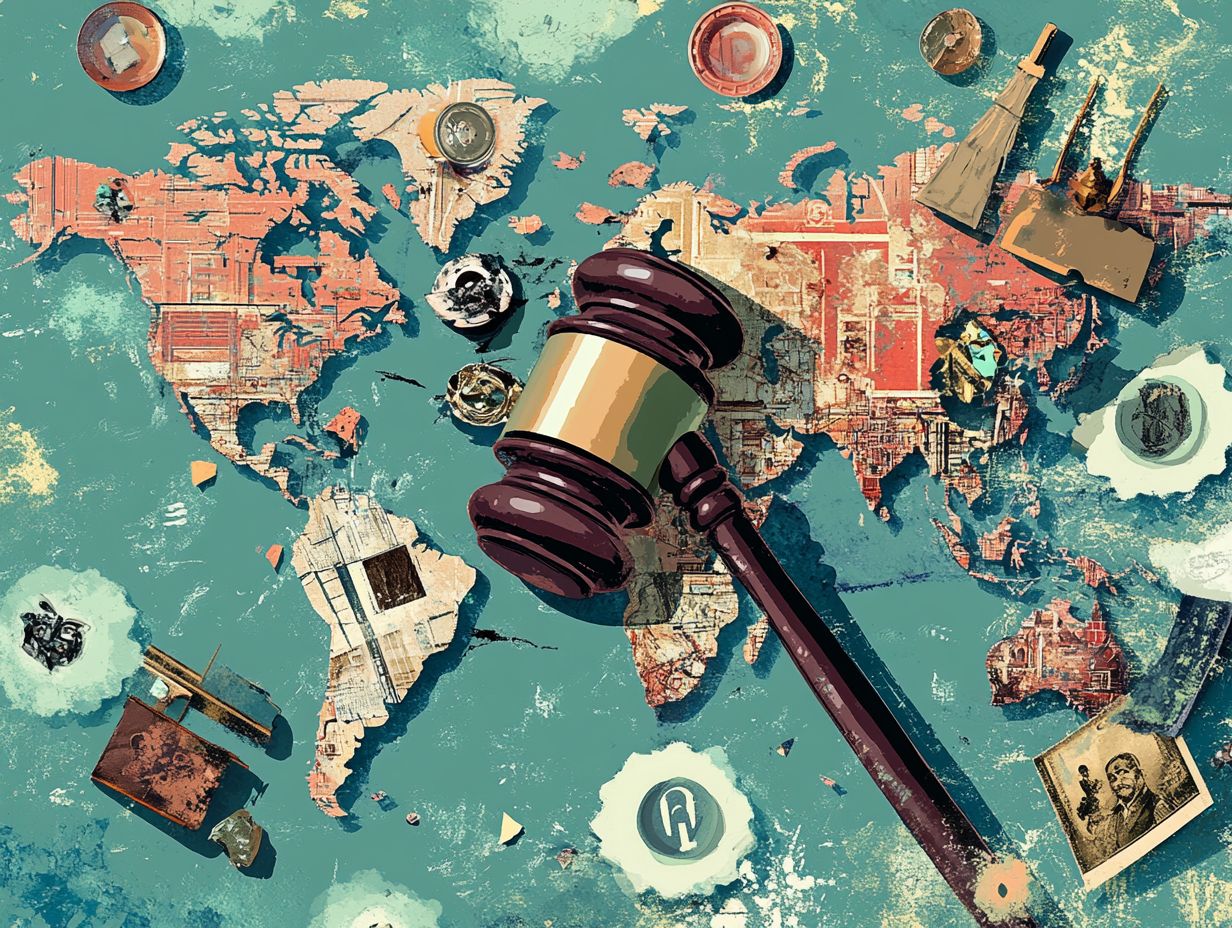
Copyright infringement is the not allowed use or reproduction of creative works. It comes with serious economic consequences and undermines the innovation that powers industries relying on intellectual property protection.
When artistic creations like music, literature, or software are copied or shared without permission, it threatens the livelihoods of creators and the overall vitality of entire sectors. Creators facing infringement often suffer financial losses that can stop them from making new works.
Industries dependent on original content may find their returns shrinking, which ultimately reduces investments in talent and innovation. While frameworks like the Digital Millennium Copyright Act exist to protect these creators, violations still happen.
The consequences of such infringement extend beyond individual creators, slowing down economic growth and limiting cultural diversity by restricting resources for new ideas and innovative projects.
5. Trade Secret Misappropriation
Trade secret misappropriation occurs when secret business information is accessed or shared without your permission. This can lead to significant financial losses and put your intellectual property protection efforts at risk.
These secrets can include sensitive information like formulas, product designs, customer lists, and marketing strategies all crucial for maintaining your competitive edge in the market.
Misappropriation can happen through bribery, spying, or even unintentional leaks from employees who don t understand the sensitivity of certain information.
If this happens, your legal options often involve filing lawsuits to seek damages or injunctions against those offenders.
This is why implementing non-disclosure agreements (NDAs) is vital. NDAs create a formal understanding between parties about confidentiality, reinforcing your proactive measures against potential breaches.
What Are the Consequences of IP Law Violations?
The consequences of intellectual property (IP) law violations go far beyond legal issues; they include financial damages and can severely slow down the economy. This can hurt both businesses and consumers.
When you violate IP rights, you often face significant penalties, including lawsuits and fines that can greatly destabilize your finances and scare off future investors. Such violations create uncertainty and mistrust, hindering competition and stifling investment in new technologies.
For instance, consider a major tech firm s not allowed use of patented software. This not only leads to damages but also slows down industry innovation, making original creators less likely to pursue new developments.
This creates a ripple effect: as innovation stalls, entire sectors can face economic downturns, ultimately affecting job creation and consumer choice.
This creates a market where creativity gets undervalued and growth opportunities dwindle, leaving you to navigate a challenging environment with fewer prospects.
To avoid these issues, it’s crucial to take steps to protect your IP rights and seek legal advice promptly.
How Can Businesses Protect Themselves from IP Law Violations?
You can effectively safeguard your business from violations of intellectual property laws by adopting proactive protection measures and implementing robust cybersecurity protocols.
Gaining a comprehensive understanding of the legal frameworks that govern IP rights is essential.
By taking specific steps such as registering trademarks and patents, you enhance your brand’s value and establish a formidable barrier against potential infringements.
Regularly monitoring for any unauthorized use of your intellectual property is crucial. This may involve leveraging tools and techniques used to investigate digital crimes to uncover violations and gather compelling evidence.
Training your employees on IP laws fosters a culture of awareness and responsibility. It ensures that every member of your team grasps the importance of protecting valuable ideas.
A strategic approach to IP protection drives innovation, provides a competitive edge, and paves the way for long-term business success.
What Are the Most Common Industries Affected by IP Law Violations?
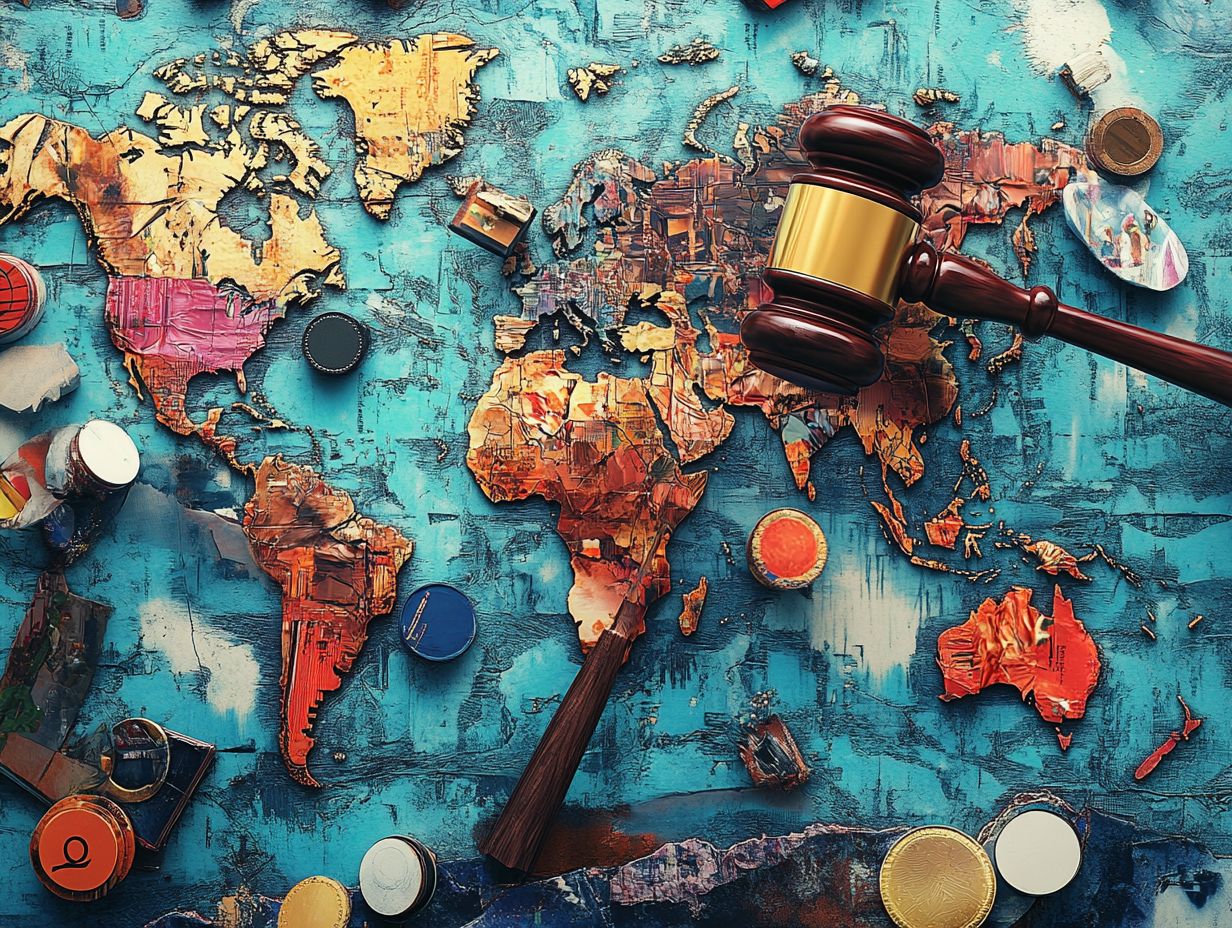
Several industries, including technology, pharmaceuticals, and entertainment, often face the repercussions of violations of intellectual property laws.
These infringements can lead to substantial economic consequences and job losses that resonate throughout the broader economy.
Take the technology sector, for instance. When software codes are stolen, millions in revenue can evaporate, stifling innovation and deterring future investment.
In the pharmaceutical realm, counterfeit drugs present serious health risks and erode trust and revenue, potentially hindering vital research efforts.
Meanwhile, the entertainment industry contends with rampant piracy, resulting in significant financial losses that impact not only major studios but also independent creators striving to make their mark.
In response to these challenges, businesses are increasingly adopting advanced tracking technologies, reinforcing legal protections, and launching public awareness campaigns.
These measures aim to safeguard intellectual assets and cultivate a more robust market environment that encourages creativity and innovation.
What Are the Differences in IP Laws Across Different Countries?
Intellectual property laws vary significantly from one country to another, shaped by distinct cultural, economic, and legislative landscapes.
This variation underscores the importance of international collaboration, especially among Five Eyes nations, to bolster IP protection.
You may notice these differences are pronounced some regions lean heavily towards copyright protections, while others prioritize patents or trademarks.
For example, European countries often enforce stricter copyright regulations compared to the more relaxed frameworks seen in some developing nations.
Amid these disparities, there s a growing recognition of the necessity for consistent enforcement, particularly as the digital landscape complicates issues surrounding piracy and counterfeiting.
International treaties, like the TRIPS Agreement, are essential in harmonizing these laws and facilitating dialogue and cooperation.
By joining forces, nations can develop robust systems that effectively combat IP theft on a global scale, ensuring that creators and innovators receive the protection they deserve.
How Can Individuals Report IP Law Violations?
You can easily report violations of intellectual property laws through various channels.
These channels include local enforcement agencies, patent offices, and online platforms dedicated to facilitating such reports.
If you face IP theft, knowing whom to contact is essential. Organizations like the U.S. Copyright Office and the U.S. Patent and Trademark Office serve as key authorities that can guide you through the reporting process.
Raising public awareness about the consequences of IP violations is crucial for finding effective solutions. An informed society is better equipped to recognize and understand IP theft, empowering individuals to take meaningful action against it.
Stay informed and protect your creations today!
What Steps Can Be Taken to Prevent IP Law Violations?
To prevent IP law violations, you need a thorough approach. This includes protective measures, proactive strategies, and raising public awareness to cultivate a culture of respect for intellectual property (IP) rights.
To effectively tackle these challenges, implement targeted employee training programs. These programs should educate staff on the importance of IP and the potential repercussions of violations.
Complement these efforts with awareness campaigns that utilize engaging content and real-life case studies. Establishing robust security protocols such as access controls and regular audits will significantly reduce unauthorized access to sensitive information.
By prioritizing these proactive steps, you protect your valuable creations and help others appreciate their importance.
Frequently Asked Questions
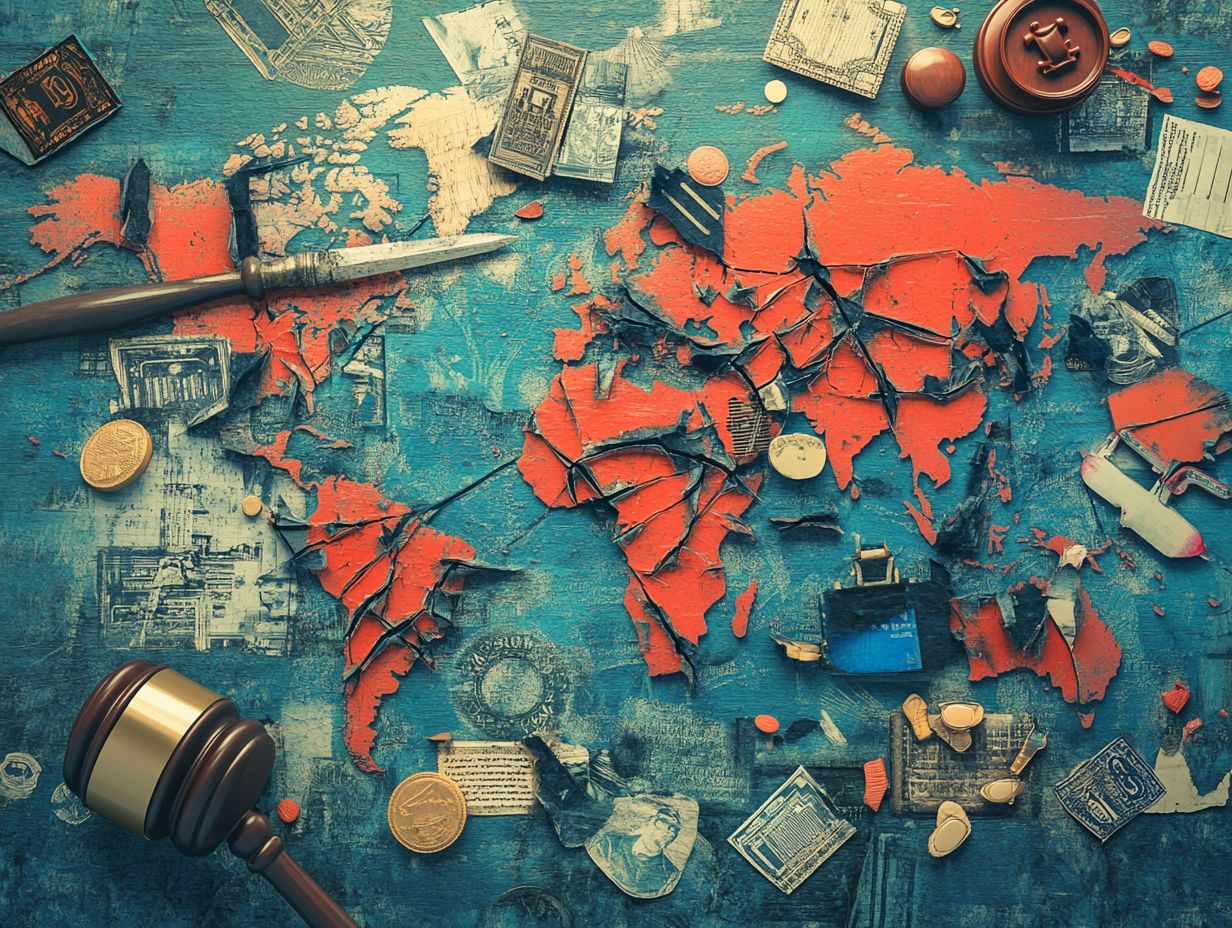
Here are the top 5 IP law violations you should know about.
The 5 most common IP law violations worldwide include trademark infringement, copyright infringement, patent infringement, trade secret theft, and counterfeiting.
How prevalent are these IP law violations?
These IP law violations are very common and occur on a global scale. They are a major concern for businesses and individuals alike.
What is trademark infringement?
Trademark infringement occurs when someone uses a trademark that is similar to an existing trademark without permission, causing confusion and harm to the original trademark owner.
What is copyright infringement?
Copyright infringement is the unauthorized use of someone else’s copyrighted material, such as music, movies, books, or artwork. This violation can occur through reproduction, distribution, or public display.
How is patent infringement defined?
Patent infringement is the unauthorized use, sale, or manufacture of a patented invention. This can occur through the creation of a similar product or using the patented technology without permission.
What is trade secret theft?
Trade secret theft is the illegal acquisition of confidential information or trade secrets, such as customer lists, formulas, or processes, from a company. This can be done through theft, espionage, or breach of contract.
Stay informed and protect your rights today!

